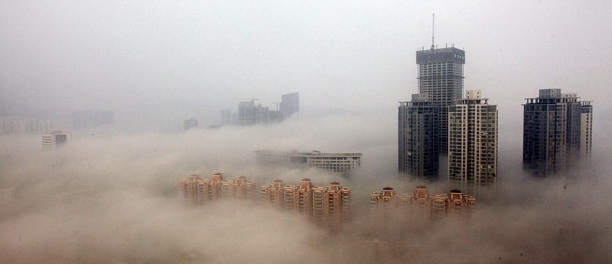While some might consider a tradeoff between a country’s economic development and the resulting socio-environmental burdens to be “justifiable,” China has reached the tipping point at which the air crisis is significantly impacting economic development as well.
The well-being of China’s market is beginning to suffer, with stakeholders reluctant to engage with a country in the middle of an emissions crisis. Meanwhile, the human and environmental interests, necessary to maintain the economic revitalization China has enjoyed for the past few decades, are negatively impacted by physical externalities of pollution as well, as explained in our previous article giving a rundown of China’s emissions crisis. Health concerns and inefficient management of natural resources are making economic development increasingly unsustainable.
While other countries may have the luxury of debating the impact of carbon emissions and the need to create binding agreements, China’s battle with air pollution has reached a critical point at which stakeholders are catalyzed into action. Simply put, the supposed tradeoff between emissions and development has become a cost to multiple aspects of society that not even China’s economic strength and benefits can support.

ECONOMY: A TRADEOFF NO LONGER JUSTIFIED
The economic externalities of air pollution are no longer purely theoretical or “justified” by the net benefits of economic growth and development. Emissions are considered to negatively impact between 2% and 10% of gross national income, and in 2010, the Ministry of Environmental Protection estimated that 1.5 trillion RMB (around 3.5% of the nation’s GDP) was lost due to emissions-related causes.
Because of the physical discomfort and health risks for individuals living in China’s high-polluted cities, potential customers, skilled employees, and executives are dissuaded from participating in the Chinese market as consumers or producers. The resulting loss of sales and business expertise is now hurting local and foreign companies in China, causing some corporations to consider moving base elsewhere.
This is clearly a major concern for stakeholders in the Chinese economy aiming to continue the exponential growth that has been experienced over the past two decades. Efforts are in development to reduce these unintended consequences on the economy, and preventative measures on both the production side and the consumption side are being developed to aid this. Although China is currently transitioning from a heavy-industry economy to a more service-based economy with fewer emissions from factories, there is little doubt that air pollution will continue to be a considerable issue for economic growth going forward.
ENVIRONMENT: RESOURCE MANAGEMENT
Environmental impacts of energy emissions exist on both a macro and micro level. The impact of CO2 on the global environment is well-documented, and as a result, heavy international pressure has been placed on China. Mining of coal and power plant construction, particularly when poorly managed, lead to direct environmental impacts to the surrounding area. Leaching of chemicals can pollute local water sources, and the use of water itself within the processes can disrupt local environment equilibrium. The chemicals present in emissions can react with molecules in the atmosphere to cause harmful secondary organic aerosols. These can then be precipitated as acid rain which contributed to the weathering of buildings, as well as impacted soil pH, plant growth — the key to China’s agriculture sector.
Even with concerns of conservation aside, the environmental impacts of emissions require close attention for simple, practical reasons. To support its massive population of over 1.3 billion people, China cannot afford a tradeoff between industrialization and sustained agricultural practice. For the nation’s raw, natural resources like food and water to survive in the future, better management of emissions and their externalities is a must.

HEALTH: THE HUMAN INTEREST
Over the development of its use in urbanizing societies, coal consumption has contributed heavily to the skyrocketing levels of PM2.5 and SO2 in China. Short-term exposure to particle inhalation can lead to respiratory emergencies, particularly for sensitive groups, while long-term exposure can lead to more chronic issues like reduced cardiovascular function. Furthermore, as car ownership has increased with urban development, so have congestion levels. Car emissions produce significant levels of NO2, harmful gas that can cause lung inflammation — particularly for those who live in areas with dense roadways and heavy traffic, which is the case for much of China’s urban population. These gases all contribute towards the high levels of premature death rates that are seeing an increase throughout China.
The most important stakeholder is the consumer, the citizen, the resident of the cities built by urbanization — and the one whose physical livelihood and future well-being relies on better management of emissions just as much as economic growth. For a comprehensive overview of the causes of China’s emissions and the effects of particles on human and environmental health, see our recent article giving a rundown on the “nitty-gritty” of the air crisis.
FROM ACCEPTANCE TO ACTION
The growing tangibility of the issues faced in China is providing the catalyst for purposeful, effective change and innovation. While other, less noticeable social issues sometimes find less urgency among policymakers and stakeholders, air pollution is something that neither China’s government or citizens are willing to deny or ignore. The air crisis is gaining traction among industry leaders, NGOs, the media, and the citizenry, and collaboration and actions towards solutions are being set in motion.
But we’ll dive into that next week.
For more insights into China’s emissions, stakeholder concerns, and the tangible externalities private actors need to address, check out Collective’s past and upcoming articles in our ongoing series on this topic. You can also download our recently released report on Air Pollution in China here.
This article was prepared from Collective’s air pollution report by Gabrielle Williams, Research Analyst at Collective Responsibility.
